Warning: Undefined variable $page_cta in /var/www/vhosts/dev.fastspot.com/httpdocs/clients/siena/templates/basic/content.php on line 10
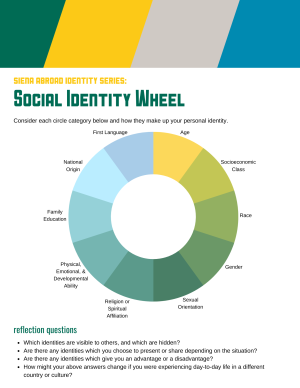 The Center for International Programs is committed to supporting all Siena students to have the opportunity to study abroad, regardless of an individual’s race and ethnicity, religion, gender and/or gender identity, sexual orientation, age, physical or mental ability, veteran status, socio-economic or class status.
The Center for International Programs is committed to supporting all Siena students to have the opportunity to study abroad, regardless of an individual’s race and ethnicity, religion, gender and/or gender identity, sexual orientation, age, physical or mental ability, veteran status, socio-economic or class status.
Study abroad gives you the opportunity to learn about yourself and your culture, as well as to consider the cultural norms of your host country. The manner in which you are viewed in your host country may differ from what you are used to here in the United States. One of the best things you can do to prepare for differences is learn about the attitudes, laws, customs, and expectations in your host country as you plan to go abroad. We encourage all students to use the following resources (including our social identity wheel) and speak with a study abroad advisor in the Center for International Programs to learn more about personal identity and study abroad.
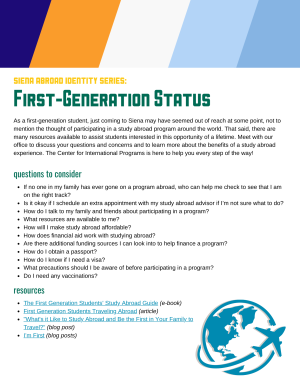 First-generation status
First-generation status
As a first-generation student, just coming to Siena may have seemed out of reach at some point, not to mention the thought of participating in a program in another destination. That said, there are many resources available to assist students interested in this opportunity of a lifetime. The Center for International Programs is here to help you every step of the way!
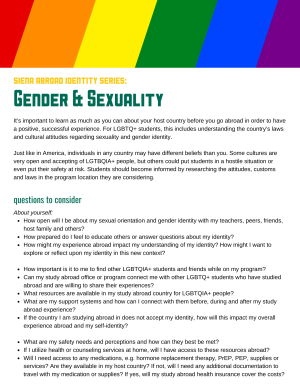 gender and sexuality
gender and sexuality
It’s important to learn as much as you can about your host country before you go abroad in order to have a positive, successful experience. For LGBTQ+ students, this includes understanding the country’s laws and cultural attitudes regarding sexuality and gender identity.
Just like in America, individuals in any country may have different beliefs than you. Some cultures are very open and accepting of LGTBQIA+ people, but others could put students in a hostile situation or even put their safety at risk. Students should become informed by researching the attitudes, customs and laws in the program location they are considering.
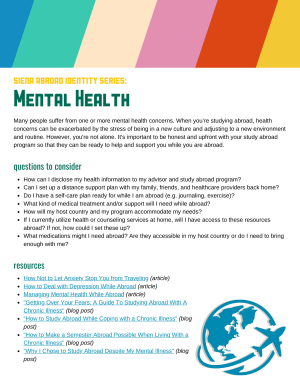 mental health
mental health
Many people suffer from one or more mental health concerns. When you’re studying abroad, many health concerns can be exacerbated by the stress of being in a new culture and adjusting to a new environment and routine. However, you're not alone. It’s important to be honest and upfront with your program so that they can be ready to help and support you while you are abroad.
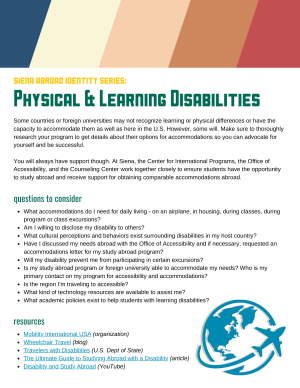 Physical & learning disabilities
Physical & learning disabilities
Some countries or foreign universities may not recognize learning or physical differences or have the capacity to accommodate them as well as here in the U.S. However, some will. Make sure to thoroughly research your program to get details about their accommodations so you can advocate for yourself and be successful.
You will always have support though. At Siena, the Center for International Programs, the Office of Accessibility, and the Counseling Center work together closely to ensure students have the opportunity to study abroad and receive support for obtaining comparable accommodations abroad.
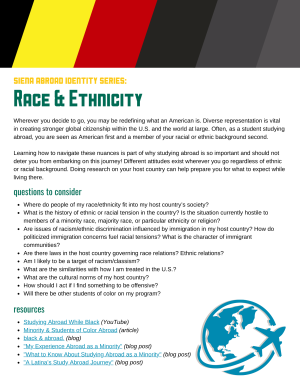 race & ethnicity
race & ethnicity
Wherever you decide to go, you may be redefining what an American is. Diverse representation is vital in creating stronger global citizenship within the U.S. and the world at large. Often, as a student studying abroad, you are seen as American first and a member of your racial or ethnic background second.
Learning how to navigate these nuances is part of why studying abroad is so important and should not deter you from embarking on this journey! Different attitudes exist wherever you go regardless of your ethnic or racial background. Doing research on your host country can help prepare you for what to expect while living there.
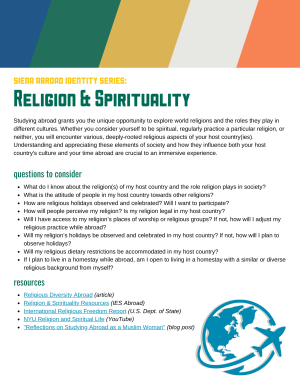 religion & spirituality
religion & spirituality
Studying abroad grants you the unique opportunity to explore world religions and the roles they play in different cultures. Whether you consider yourself to be spiritual, regularly practice a particular religion, or neither, you will encounter various deeply rooted religious aspects of your host country(ies). Understanding and appreciating these elements of society and how they influence both your host country's culture and your time abroad are crucial to an immersive experience.
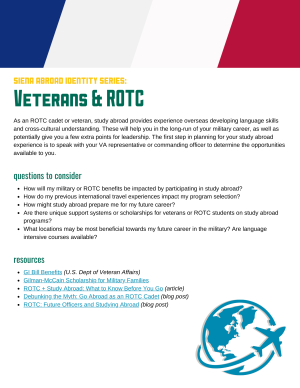 veterans & rotc
veterans & rotc
As an ROTC cadet or veteran, study abroad provides experience overseas developing language skills and cross-cultural understanding. These will help you in the long-run of your military career, as well as potentially give you a few extra points for leadership. The first step in planning for your study abroad experience is to speak with your VA representative or commanding officer to determine the opportunities available to you.